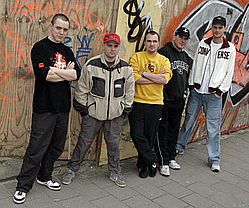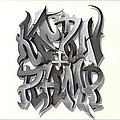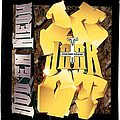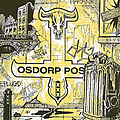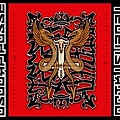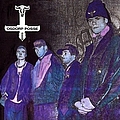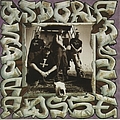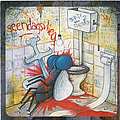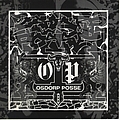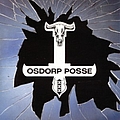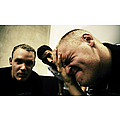Osdorp Posse Biography
Osdorp Posse was a five-piece hardcore rap crew from the Dutch capitol Amsterdam, consisting of four mc’s: Def P (main rapper), Seda (rapper & beatcreator), IJsblok (rapper & manager) and King (rap, also known as ‘ Koning’ in the early days), and one DJ: Deegmeester Daan, who joined the group in 2000. They were known for their hardcore attitude, in your face lyrics, and explosive live shows. One of the group’s trademarks was the experimentation with Dutch lyrics, which resulted the (back then) four piece in being the first ever crew in The Netherlands to release a complete demo in their native language. This turned out to be the start of a new genre they still call ‘Nederhop’ to this day, a term consisting of the words “Nederlandse” (Dutch) and “Hip-Hop”. The start of Osdorp Posse can be tracked back as far as 1986, when Def P (real name Pascal Griffioen) made his debut on the Dutch hip-hop scene with the group Funky Fresh Force, consisting of him and DJ Dov, who would later become a famous House DJ under the pseudonym DJ The Prophet. In 1988 Griffioen started experimenting with Dutch lyrics as a joke (translating American rap lyrics from groups such as N.W.A.), and a creative exercise (writing a couple of ‘real’ songs). His nephew Marco (later on taking on the nickname IJsblock – a literal translation of N.W.A.’s infamous Ice Cube) joined in the musical tomfoolery, as they recorded raps on instrumental tracks from their record collection, using nothing but a tape deck and a microphone. It wasn’t until Marco and Pascal met Robin (now known as Seda) and Arthur (King) that they got down to writing real material that they found suitable for recording. Even though their musical playground that they had by then labelled Osdorp Posse (named after the Amsterdam neighbourhood Osdorp, where they all lived) consisted of a large group of friends with a continuously changing line-up, the core of the Posse was the four guys, and would remain so until twelve years later. With a lot of the co-rappers leaving the group with no interest in taking Osdorp Posse to a next level, the group recorded an infamous demo as a fourpiece. The nameless cassette – which quickly became known as ‘De Rode Demo’ (The Red Demo) – was handed out to friends, and travelled the country, taking the underground alternative music scene by storm through the tape trading circuit. One of the many people who got hands on De Rode Demo was Saskia Sleger, the owner of the underground dancelabel DJAX. Recognizing the originality as well as the obvious talent, Sleger decided to contact the group and offer them a contract. Hardly believing what just happened to them, the young rappers immediately signed with DJAX, without reading the fine print. Def P later described this move in the band’s biography ‘Tien Jaar OP’ as impulsive and a bit naïve, but it turned out to be a good thing: the start of legendary career. Now having to actually release cds instead of fooling around with a tapedeck, Pascal, Marco, Robin and Arthur franticly started writing out the material that they had come with before heading to a local studio in 1992, recording the first ever ‘Nederhop’ cd: the poorly produced yet explosive, hardcore and edgy twenty three song classic ‘Osdorp Stijl’ (Osdorp Style). With an official release in stores, the group started on a journey that moved their live-shows away from the squat- and fret houses, onto the ‘ real’ alternative music scene. The album was an instant underground classic, which not only spawned an entire generation of Dutch Hip-hop acts at the time, but also quickly finding a following within a diverse group of alternative music fans such as punkers, metalheads, rockers and many alike. The following two releases were plagued by the same production problems as their infamous debut, but through their sheer determination, explosive live shows and hardcore, relentless lyrical attitude became underground hits nevertheless. It wasn’t until they were asked to play the warm-up show at the biggest festival in the Netherlands, Pinkpop, that they got recognition from a larger audience. Their fourth cd entitled ‘Afslag Osdorp’ (Osdorp Exit), was released soon after the legendary festival appearance, and was the groups largest commercial success to that date. Riding the wave of word-to-mouth advertising following Pinkpop and their years on end of touring and self promoting (being ignored by mainstream media and critics), Afslag Osdorp sold thousands of copies; an achievement that was until then unthinkable for a Dutch rap act. Later that year, with their popularity growing to a new height, Osdorp Posse played one of the most legendary and afterwards most talked about performances on the Dutch alternative music scene at the Lowlands Festival. Something that was euphemistically called a programming mistake, the group was set to play the smallest tent (Charlie) in the afternoon. Even though the Amsterdam crew warned the festival organisation about the possible consequences, the foursome’s advice to move their show to a bigger tent fell was ignored, resulting in half the festival attendees trying to fit in the small, claustrophobic space in anticipation of what was then one of the biggest things in Dutch music: Osdorp Posse. After the first couple of notes were played, the frantic crowd started to mosh, pogo and crowdsurf with such an enthusiasm that they nearly destroyed the entire tent. Def P later explained he had no idea how dangerous the situation was, that eventually led to an early ending of the gig when the crowd rushed to the stage, crushing the structure. No one got seriously hurt, yet everyone had witnessed and taken part in a legendary festival moment, talked about to this day. In 1996 the group received the prestigious ‘ Pop Prijs’ (Pop Prize), as a recognition of their pioneering role in the Dutch hip-hop scene. That year also marked another legendary festival performance; the Dynamo Open Air festival – at that time the most important Heavy Metal event in the world – playing as the first and only hip-hop crew ever in front of more then a 100.000 longhaired metalheads, a large portion of whom were stoned Germans (enjoying the music all the same). The following year, ‘ Osdorp’ returned to Pinkpop, this time playing not once but twice: first on the small stage, returning on the final day at the main stage in front of 60.000 people. After the commercial and artistic successes of albums such as ‘Brilliant, Hard en Gespelen’ (Brilliant, Hard and Polished) – recorded with death metal band Nembrionic, and the chart success ‘Geendagsvlieg’ (literally: No day fly, as a play on words to the term ‘one day fly’, emphasizing their timelessness) the Posse left their long time label Djax to start up their own label called RAMP Records (consisting of the first letters in their names: Robin, Arthur, Marco, Pascal). In 2000, the group’s first release on their own turf called ‘ Kernramp’ (Nuclear Disaster) became their biggest commercial success, and remains so to this day. For the first time in their 12 year long career, Osdorp Posse even landed on the Dutch TOP 40 charts with their single ‘ Origineel Amsterdams’, which eventually ploughed into the top 10. The release of their eighth album also marked the first change in line-up the group had seen since the early demo days: DJ ‘Deegmeester’ Daan – who already joined the band on stage for quite a while – became the fifth member of Osdorp Posse. That year they returned to Lowlands Festival as a five-piece, this time on a bigger stage. Once again controversy was part of the group’s performance, with Def P openly protesting against the nationwide crowd surf ban (as a result to the Roskilde tragedy earlier that year). Around that time the music industry started crashing down. With programmes such as Napster and Kazaa providing fans with free – yet illegal – music, Osdorp Posse’s new label had a hard time lifting off. Every release after ‘ Kernramp’, such as ‘ Tegenstrijd” (meaning both Counter Battle, and Contradiction in Dutch) and Hollandse Hardcore Hip-Hop Helden all saw decreasing sales figures. At the same time, the genre the group created – Nederhop – had become a mainstream phenomena with acts such as Extince, Def Rhymz, and new school artists and groups like Raymster and Opgezwolle taking over the Dutch hiphop scene. Osdorp Posse, never being a favourite of the mainstream media – could only witness their own decline. Around 2004, the group had plummeted back into the underground scene, once again playing the smaller venues. The groups hardcore following had eye for their later releases with bands such as Laberinto and Blind Justice, but stayed true to their heroes all the same. Near the end of 2008, the group has announced to call it quits. After a release party of their final effort entitled ‘2 Decennia’ (Two Decades), Osdorp Posse embarked on a farewell tour, taking them to all the places they played, rocked the mike at, and witnessed their fanatic following go crazy to their hardcore style of performing. The group’s swansong took place their own turf, in the Amsterdam club De Melkweg in September of 2009, leaving a legacy that can not be ignored or forgotten: the invention and perfection of Nederhop.
Top Osdorp Posse Lyrics
Write a comment
What do you think about Osdorp Posse? Let us know in the comments below!
Osdorp Posse Albums
Similar artists
- ExtinceHip-Hop
- HeideroosjesPunk/Rock
- OpgezwolleHip-Hop
- ABNHip-Hop
- SpookrijdersHip-Hop
- SteenHip-Hop
- Green LizardRock
- Doe MaarReggae
- BrainpowerHip-Hop
